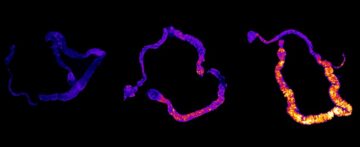Kevin Jiang in Harvard Magazine:
 The first signs of insufficient sleep are universally familiar. There’s tiredness and fatigue, difficulty concentrating, perhaps irritability or even tired giggles. Far fewer people have experienced the effects of prolonged sleep deprivation, including disorientation, paranoia and hallucinations. Total, prolonged sleep deprivation, however, can be fatal. While it has been reported in humans only anecdotally, a study in rats conducted by Chicago-based researchers in 1989 showed that a complete lack of sleep inevitably leads to death. Yet, despite decades of study, a central question has remained unsolved: why do animals die when they don’t sleep?
The first signs of insufficient sleep are universally familiar. There’s tiredness and fatigue, difficulty concentrating, perhaps irritability or even tired giggles. Far fewer people have experienced the effects of prolonged sleep deprivation, including disorientation, paranoia and hallucinations. Total, prolonged sleep deprivation, however, can be fatal. While it has been reported in humans only anecdotally, a study in rats conducted by Chicago-based researchers in 1989 showed that a complete lack of sleep inevitably leads to death. Yet, despite decades of study, a central question has remained unsolved: why do animals die when they don’t sleep?
Now, Harvard Medical School neuroscientists have identified an unexpected, causal link between sleep deprivation and premature death. In a study on sleep-deprived fruit flies, published in Cell on June 4, researchers found that death is always preceded by the accumulation of molecules known as reactive oxygen species (ROS) in the gut. When fruit flies were given antioxidant compounds that neutralize and clear ROS from the gut, sleep-deprived flies remained active and had normal lifespans. Additional experiments in mice confirmed that ROS accumulate in the gut when sleep is insufficient.
The findings suggest the possibility that animals can indeed survive without sleep under certain circumstances. The results open new avenues of study to understand the full consequences of insufficient sleep and may someday inform the design of approaches to counteract its detrimental effects in humans, the authors said. “We took an unbiased approach and searched throughout the body for indicators of damage from sleep deprivation. We were surprised to find it was the gut that plays a key role in causing death,” said senior study author Dragana Rogulja, assistant professor of neurobiology in the Blavatnik Institute at HMS. “Even more surprising, we found that premature death could be prevented. Each morning, we would all gather around to look at the flies, with disbelief to be honest. What we saw is that every time we could neutralize ROS in the gut, we could rescue the flies,” Rogulja said.
More here.
